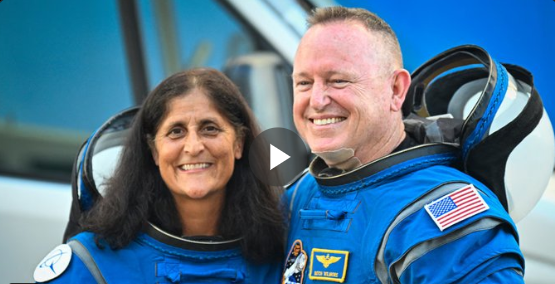It is looking more and more like it will take Elon Musk to come to the rescue of these stranded astronauts.
Two NASA astronauts, Sunita “Suni” Williams and Barry “Butch” Wilmore, are currently stranded on the International Space Station (ISS) due to technical issues with the Boeing Starliner spacecraft. Originally planned as a brief mission, their return has been delayed indefinitely as engineers work to address concerns with the Starliner’s thrusters and other systems. While the situation is challenging, both astronauts have expressed confidence in the spacecraft’s ability to bring them home safely once the issues are resolved (The Independent).
You wouldn’t board a flight if the chance of making it back safely was only 1 in 270. Yet, those are the odds NASA deems acceptable for the potential loss of crew (LOC) during a 210-day mission aboard the International Space Station (ISS). These sobering statistics weighed heavily on the minds of NASA officials during an August 14 press conference, where they addressed the ongoing efforts to ensure the safe return of astronauts Butch Wilmore and Suni Williams, currently stranded on the ISS.
Astronauts Butch Wilmore and Suni Williams may spend up to eight months in space and return to Earth in 2025 due to multiple issues with Boeing’s Starliner. NASA is debating the safety of the spacecraft as it considers a backup plan. pic.twitter.com/vTR67M0ZOO
— CBS Evening News (@CBSEveningNews) August 7, 2024
Wilmore and Williams embarked on their mission on June 5 aboard Boeing’s new Starliner spacecraft, expecting an eight-day flight that would validate the spacecraft for future missions. This brief stay at the ISS was meant to provide the U.S. with an additional option for astronaut transport, should SpaceX’s Crew Dragon, in service since 2020, become unavailable. However, even before reaching the ISS, the Starliner encountered serious issues—five thrusters misfired, and there were five leaks in the system responsible for pressurizing the thrusters with gaseous helium.
While the crew and Starliner safely docked at the ISS, what was supposed to be an eight-day mission has stretched into more than eight weeks as Boeing and NASA work to resolve the technical problems. NASA has even considered an extreme contingency plan: sending the Starliner back to Earth without its crew. If enacted, this plan would involve launching a SpaceX Crew Dragon in September, originally intended for a four-person mission, with just two astronauts onboard. The extra seats would then be used to bring Wilmore and Williams home in February.
Boeing remains confident in Starliner’s capabilities, as expressed in their August 7 statement, but NASA’s trust seems more cautious. Ken Bowersox, NASA’s associate administrator for space operations, announced during the August 14 press conference that a high-level flight readiness review would be conducted before the end of August to decide whether it’s safe for the astronauts to return aboard Starliner. A critical factor is the spacecraft’s batteries, which are designed to hold a charge for only 45 days. These batteries have been recharged multiple times by the ISS, but their longevity is limited.
REMINDER: There are two NASA astronauts who have been left STRANDED IN SPACE since June due to Boeing Starliner issues. (Yes, the same Boeing with all of the plane problems.)
NASA says they will be stuck there until nearly March of next year!! They were only supposed to be there… pic.twitter.com/QZsrXyCeB7
— HustleBitch (@HustleBitch_) August 12, 2024
Boeing, already under scrutiny for Starliner’s delayed debut and its $1.5 billion cost overrun on a $4.2 billion contract, now faces additional pressure. NASA and Boeing are working closely to ensure that all decisions regarding the astronauts’ safety are meticulously informed.
One significant challenge is that the Starliner’s faulty thrusters are housed in the service module, which is jettisoned before reentry and incinerated in the atmosphere. This means no post-mission examination of the faulty components is possible, so NASA is relying heavily on telemetry and data monitoring to understand the issues.
Despite some calls for a spacewalk to inspect the thrusters, NASA has ruled out this option, citing the design of the system, which does not allow for the retrieval or real-time repair of the malfunctioning parts.
NASA’s cautious approach is informed by past tragedies, such as the Challenger and Columbia shuttle disasters, which underscored the importance of addressing safety concerns before they become catastrophic. This heightened vigilance has left Wilmore and Williams in an extended and uncertain mission, though they continue to support ISS operations.
American astronauts Barry “Butch” Wilmore and Sunita “Suni” Williams are indefinitely stranded in Space. pic.twitter.com/eZlrw7ul2k
— E! News (@enews) August 10, 2024
Joe Acaba, NASA’s chief astronaut, acknowledged the psychological toll on the crew and their families, but emphasized that the astronauts are professionals who will continue their duties as required. For now, Wilmore and Williams remain stranded, as NASA and Boeing race against time to find a safe way to bring them home.
Major Points:
- NASA is working to safely return astronauts Butch Wilmore and Suni Williams, who are stranded on the ISS after their Starliner spacecraft encountered critical issues.
- The Starliner’s eight-day mission has extended to over eight weeks due to multiple thruster malfunctions and helium leaks, leading NASA to consider extreme contingency plans.
- NASA is conducting a high-level flight readiness review to determine if the Starliner is safe for the astronauts’ return, with battery life being a critical concern.
- Boeing faces scrutiny for the delayed and over-budget Starliner project, with NASA heavily relying on data monitoring since the faulty thrusters cannot be examined post-mission.
- NASA’s cautious approach, informed by past shuttle disasters, has left the astronauts in an extended mission, continuing their work on the ISS as the agency assesses their safe return options.
TL Holcomb – Reprinted with permission of Whatfinger News



